We recognise the continuous and deep connection to Country, of Aboriginal and Torres Strait Islander peoples as the first peoples of this nation. In this way we respectfully acknowledge the Traditional Custodians of this land, sea, the waters and sky. We pay tribute to the Elders past and present as we also respect the collective ancestry that has brought us all here today.
AUTHOR: KIM HARRISON
There is a common quote “You can’t be what you can’t see”. This resonates with me, but I think there is more to it. “You can only dream based on what you can see”. I’m a strong believer in the adage that people learn from behaviour, beliefs, and attitudes that they see around them. What I’ve seen and learnt in relation to gender equality throughout my career has changed dramatically. It is like a stone rolling down a hill – quickly gaining momentum and with an ever-decreasing level of resistance – which just needs to be constantly guided and encouraged.
When I first started my career, during Paul Keating’s “recession that we had to have”, I was recruited as a graduate into the Audit division in the Brisbane office of one of the then “Big 8” accounting firms. There were no female partners in Audit at that time and in fact, I don’t remember there being any female partners across the firm. This was no different to any of the other firms in town at the time, female partners were exceeding rare at that time. In fact, at that time, I remember a disproportionately low number of women in the Senior Manager and Principal/Director ranks as well.
This was not a situation unique to the accounting profession, in the main, women weren’t CEO’s or CFO’s of public companies, they weren’t partners in accounting or legal firms, they didn’t sit on Boards and they didn’t hold high positions within government departments or hold elected office. It was hard therefore to imagine the path to get to those positions as a woman, in my case to be a partner in an accounting firm. The irony of that being that of the six graduates into the division that year, five were young women. One of those graduates is still in the profession and is a partner. It isn’t one of the women. I’ve often asked myself why that is and how that came to be as I truly believe that most of those graduates had the potential to be a partner if they had wanted to be. There are many reasons, some personal, some due to circumstances and experiences and some just personal desire and ambition. However, I truly believe that it is partly because, at that time, none of us could see a woman in that role and we couldn’t see a role model that inspired us.
As my career moved on, I moved out across the world and out of the profession and into commercial roles and then onto roles within not for profits where I found my niche and also the women in leadership roles that inspired me. It was whilst working in London in one of my first positions after I left the profession, that I first worked for a female CFO. She was technically highly knowledgeable; she was experienced, and she was a great manager. It was the first time that I saw a woman in a senior finance role that I thought I would enjoy and could actually see myself doing and she encouraged me to apply for a position that I thought was beyond me when the opportunity arose.
My career moved on and over the years I continued to work, mainly for men, within finance functions across a range of companies. Generally speaking, the men I worked for had no hesitation in assisting me to gain the experience and knowledge I needed to further my career and encouraged me to think beyond the roles that I was currently doing. However, it was the women that I worked with a little later in my career who truly inspired me to follow my own path. In particular I worked for a woman who was the head of an international aid office in a war zone. She was a strong and confident woman who had no hesitation in demanding what was required to provide for the people who were under the care of her office in a predominately male dominated culture and industry. I later worked in a national arts organisation with both a female CEO and a female Creative Director. Both were highly knowledgeable and experienced in their respective fields and eager to share that knowledge. They were also both keen to work in a consultative environment and to seek and learn from other’s experience. What I learnt from all three of these women was that that passion, experience and knowledge, and a consultative approach can contribute to success both individually and professionally.
The young people, male and female, in our firm don’t think twice about women in leadership positions within our own firm or within the government departments that make up our client base. They work closely with and see women in these roles on a daily basis. I am very proud that our firm has organically grown to have a majority women in leadership roles and has a representation of 50% women across the firm. I find the young women in our firm truly inspiring. As well as working for us, they sit on Boards, they are highly active in voluntary capacities, they have their own projects outside their work with us and they aspire to positions that, at their age, I couldn’t imagine even considering. If this is the norm of today, then I am excited to think that our young women have the inspiration to dream higher and further than what they see.
Change can be slow and sometimes we need to be patient and to appreciate how far we have come before we can move forward. Do we need to disrupt current codes of behaviours, beliefs and systems that foster entrenched inequality? I would argue that we already are. The professional world for women has changed markedly during my career and I think that continues to be the case. The most important part of that, I believe, is providing someone with the inspiration, the knowledge, and the encouragement that they can aspire to be and do more than what is considered the “norm”. With what is considered the “norm” today within our firm and our clients and workplaces then I am very excited to see where the dreams of the young women of today will lead them.
AUTHOR: KIRSTY MARTIN
In the lead up to International Women’s Day I have been reflecting on the progress we’ve made and the challenges that persist on the path to achieving gender equality. Although there are a multitude of barriers that remain, a key driver of many gender-based inequalities is the relationships between, and expectations around, paid and unpaid labour. I believe a radical reimagining of both our work and home lives, with flexibility at the core, can be an important catalyst for improving gender equality (as well as diversity, equity, and inclusion in general) within organisations and across society more broadly.
The COVID-19 pandemic-induced mass flexible working experiment has provided us with the evidence to demonstrate that large scale flexible working is indeed viable and desirable. When I talk about flexibility, I mean discretion in where, when, and how work is undertaken. For example, through varied starting and finishing times, reduced hours, changed patterns of work (such as job sharing), and changed working locations including working from home. Access to these forms of flexibility has been shown to improve labour force participation, mental and physical health, access to education, and unpaid contributions to society such as care giving and volunteering, as well as reducing carbon emissions¹.
My own experience mirrors this. I start early and finish early, and regularly work from home. This has allowed me to complete further education whilst still working full-time, increase the time I have available to volunteer for not-for-profits and community organisations, and more regularly exercise and participate in sport to improve my mental and physical health. Additionally, it simply improves my productivity as I concentrate better from home when I need to do focused work, and a happy, healthy employee just has more energy and drive in general.
Despite all these benefits, because there has historically been much higher uptake of flexible working amongst women (and other disadvantaged groups), there is a risk that flexible working can actually ingrain existing inequalities if it is not designed and applied with equity explicitly in mind. People who work flexibly may be subject to ‘flexibility bias’, in which they are penalised in their careers for not meeting the stereotype of the ‘ideal worker’². They may be considered less competent, less committed, and less deserving of work rewards. Similarly, due to ‘proximity bias’, in which managers show preference to those employees with whom they are physically co-located, flexible workers may be denied or overlooked for networking opportunities, desirable work projects, promotions, and career advancement³ . If uptake of flexible working is higher amongst those who have been historically disadvantaged at work, and policies, procedures, and most importantly – cultures, aren’t explicitly designed to reduce the risk of flexibility biases, existing inequalities will be exacerbated.
One simple way to reduce flexibility biases is to increase the uptake of flexible arrangements across all workers, therefore altering the social norm of the ‘ideal worker’ so that employees who work flexibly are less likely to be treated differently. From a gender equality perspective, encouraging more men to utilise flexible arrangements is also crucial to improving equality outside of work as it can act as a catalyst to support more equal sharing of domestic labour and care tasks.
Given the proven benefits of flexible working, we need to treat it as an investment in a happier, healthier, and more equitable society, and we should be finding ways to proactively encourage flexibility and maximise its benefits. Roles need to be designed with a level of flexibility built in and to allow work to progress effectively when teams are working asynchronously. This will require more effective communication and reconsideration of ‘traditional’ ways of doing things from meetings through to work allocation and performance management. Conveniently, many of these changes also support greater productivity and work satisfaction regardless of whether staff are working flexibly or not.
The status quo has been well and truly challenged, and we are now in a position to decide how we take these lessons forward to engrain greater equality into the future. Encouraging greater uptake and support for flexible working across the entire workforce is one way to support the continued fight for gender equality both at work and at home.
¹ Kossek, E. E. & Kelliher, C. (2022). Making Flexibility More I-Deal: Advancing Work-Life Equality Collectively. Group & Organization Management. DOI: 10.1177/10596011221098823
² O’Connor, L. T. & Cech, E. A. (2018). Not Just a Mothers’ Problem: The Consequences of Perceived Workplace Flexibility Bias for All Workers. Sociological Perspectives, 61(5), 808-829. doi:10.1177/0731121418768235
³ Subramanian, S. & Washington, E. F. (2022, February 25). Why Flexible Work Is Essential to Your DEI Strategy. Harvard Business Review. https://hbr.org/2022/02/why-flexible-work-is-essential-to-your-dei-strategy
AUTHOR: LILI MILLAWITHANACHCHI
In the lead up to International Women’s Day this year, I have been reflecting on the positive experiences I have had as a woman in the workplace. I have benefitted from a number of strong women in leadership positions who have advocated for me.
One in particular, actively sought my unique views and perspectives as a quietly spoken woman, and genuinely got behind them to back me up. As a career-auditor, I have had to have a thick skin in conversations with stakeholders. Instead of speaking for me in difficult conversations, she spent the time to prepare and support me to stand up for myself. She paved the way to set the stage and then gave me the time and space to build my confidence as a leader.
I remember one meeting she led by example in on a tough conversation where her views were not being heard, with men around the table explaining that raising a specific issue through an internal audit is not the way things were done around here. Watching her hold her ground and not be intimidated planted a seed in my mind, both on what I could achieve but also how far we still have to go in being seen as equals.
As I think about International Women’s Day, I am thankful for all the advocates who support and stand up for women in the workplace. While we have made progress, we still have so far go to.
AUTHOR: JO CARROLL
As I reflect on the impact accessible education has had on my career, I am very grateful for opportunities and new experiences that it has created. I have been fortunate to have had valuable and varied education across my career, which has led me to move in new and unexpected ways. Without these education opportunities I would have most likely followed a more linear and less inspiring career path.
About 5 years ago I was enrolled in a leadership training course, which we attend every few years as part of the public service. However, this one was different to others and it sent me down a fascinating path that has dramatically changed my career. This leadership course was themed around getting the best out of your team members and having good performance conversations and introduced coaching principals that were offered as an alternative to traditional management practices. I was fascinated by the broad applicability of coaching and started to read more and more about it.
My interest grew further as I learned how to apply coaching with my team members and I quickly enrolled in a Cert IV in Life Coaching. While this training was directly relevant to my role as a leader, it had broader application and I started to see it align with my other interests outside of work in yoga and wellbeing.
Following on from the Cert IV, I extended the training to include Wellness Coaching, which led to me starting a small business with my husband, with Wellness Coaching, Yoga and Personal Training services. This work is inspiring as I am able to have a positive impact on the health and wellbeing of individuals in our community.
Coaching skills also come in handy in my auditing and consulting work, giving me different techniques and tools to use with clients to help workshop ideas, develop solutions and draw out others expertise in different ways. It also gives me the confidence and skills to have performance discussions with my team, tools to use in difficult conversations, and helps me to look at the workspace through a different lens.
This exciting journey that I am on started from what I thought was ‘just another leadership course’. Through my access to education I was able to spark an interest that has given me great enjoyment as well as allowing me to continue to grow both personally and professionally.
AUTHOR: BRIONI BALE
My first full time job was working for the Commonwealth Scientific Industrial Research Organisation (CSIRO) collecting Australian tree seed for sale, and for research to increase timber quality traits for plantation timbers and other uses in Australia and internationally. There were 40-odd team members, a handful of them women and three of us who worked in the field. I spent months away every year in the bush shooting or climbing trees to bring down branches containing tree seed, collecting it in big canvas sheets, lugging them through the bush back to the car or our camp, laying them out in the sun to dry and then sieving off the leaf debris to be left with the tiny seeds.
On my first field trip a branch came down on top of a pile of felled logs. I climbed up to collect the seed only to fall, landing on my ribs. I was so embarrassed that I didn’t tell anyone what had happened. I struggled through the next few days before going home to be diagnosed with broken ribs. I learned a lot about myself on this first field trip.
I worked with Aboriginal communities in the NT and WA to establish bush tucker-suitable species trials to see what would grow and where. It was hard work, building irrigation systems, planting thousands of seedlings and mapping each trial design for future performance measurement. Winter nights were freezing (literally) sleeping in a swag in the desert and in summer temperatures got close to 50ºC and I would spend the heat of the day dragging my swag in the shade.
I travelled to some of the most incredible parts of the country. I remember driving out and passing Uluru and Kata Tjuta and on to the Gunbarrel Highway and being surprised by the grass tree oasis’ that appeared sporadically in the desert. Working in Far North QLD, I spotted koalas and tree kangaroos in the tree-tops, on the south coast of NSW we found a huge spotted gum that was estimated to be 400 years old and in VIC I drove our 4WD (OKA) truck through plantations, navigating barely drivable roads to collect timber cores samples to better understand growth patterns.
Later in my career I became an expert in vegetative propagation – growing seedlings through cuttings (clones) to maintain the superior traits or through grafting to decrease the breeding cycle time. I worked in nurseries across the Australian east coast and in PNG teaching others the techniques I had developed so they too could tap into Australian species that produced higher wood qualities in lower rainfall climates.
I also found myself in some interesting situations. Sleeping on the roof rack in the desert when there was evidence of camels so not to get trampled, being left on the side of the Stuart Highway when our vehicle broke down to ‘keep our gear safe’ only weeks after Peter Falconio (a British tourist) had been kidnapped and murdered in the same area, and changing punctured tyres when we ran out of spares, including learning how to break the bead to replace the inner tube (an activity I later learned was done inside a cage for safety purposes).
One of my favourite (and scariest) field trips was when I travelled to a very remote community in Central Province, PNG to teach them how to take sandalwood cuttings in an attempt to repopulate the declining numbers in the hope of building a local sandalwood industry. During the five-hour drive by vehicle and then two hours by boat, I’d asked one of my PNG colleagues how to say hello in local language. I climbed out of the boat and went to greet the kids only to find them running away from me. When I asked what had happened, I was told that the kids had not seen a white woman in the community before.
I feel so lucky to have had these opportunities and when I reflect back, to see how much they helped shape me and my career to date. My ability to solve problems, to think analytically and to make decisions under pressure all stem from these experiences. I also learned that working with an amazing team makes going to work everyday so much better.
Author: Kirsty Martin
We held our second annual Retreat at the beautiful Lake Crackenback Resort and Spa just a short drive from Canberra. The team has grown substantially since our first Retreat, and with COVID-19 disruptions keeping us somewhat distanced over the last year it was amazing to properly get the whole team together for two whole days to focus on our business.
Sunday
Some of the team came down early to test out some of the (many) activities. We then formally kicked the retreat off with a Welcome BBQ to give us all a chance to catch-up over dinner and drinks, to enjoy some stories around the fire pit, and to enjoy the beautiful view.

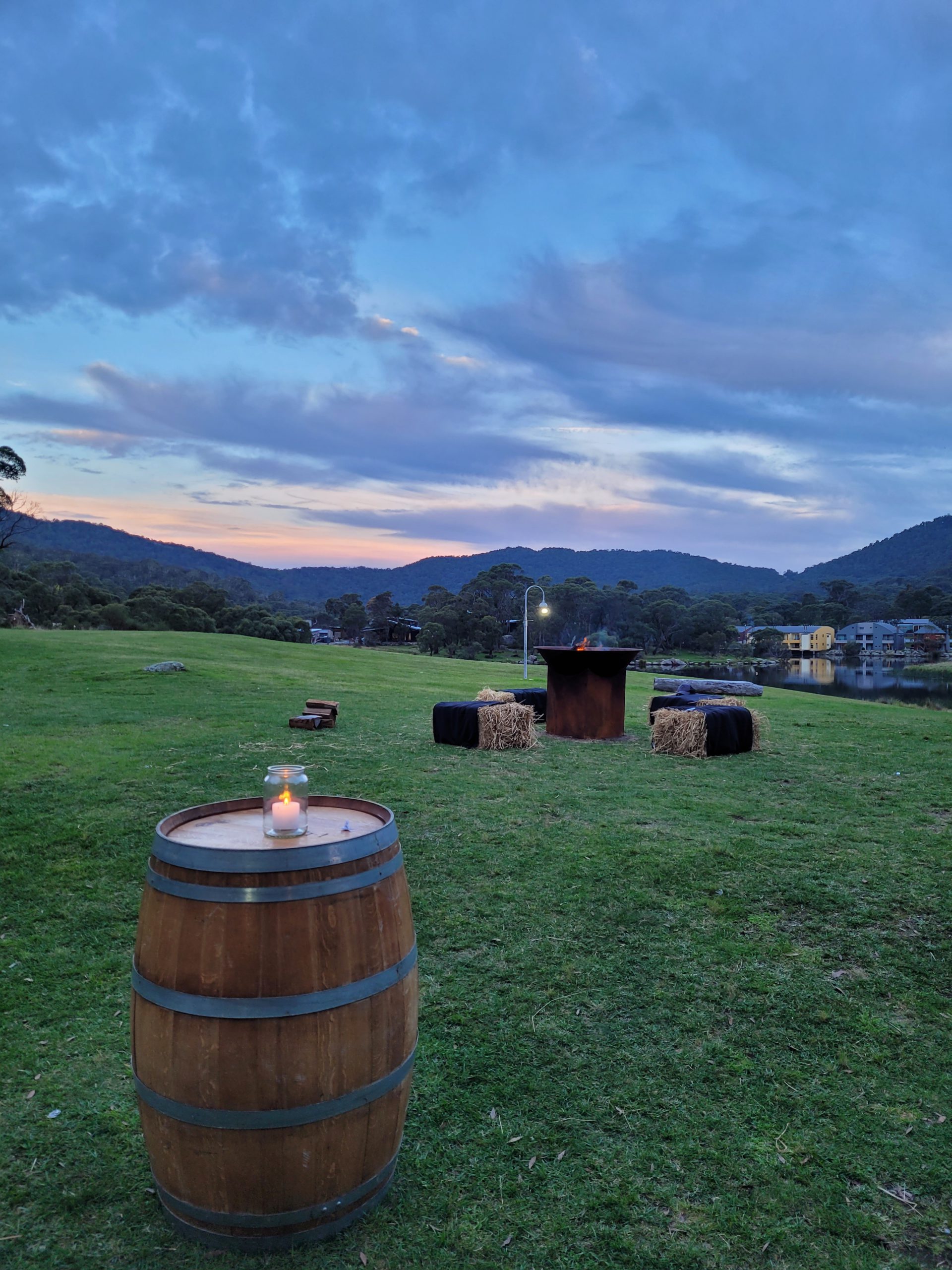
We also surprised the team with matching Sententia beanies (just in time – it got chilly once the sun went down!) and voted for our top 3 ideas for “The Pitch” (more on that later).
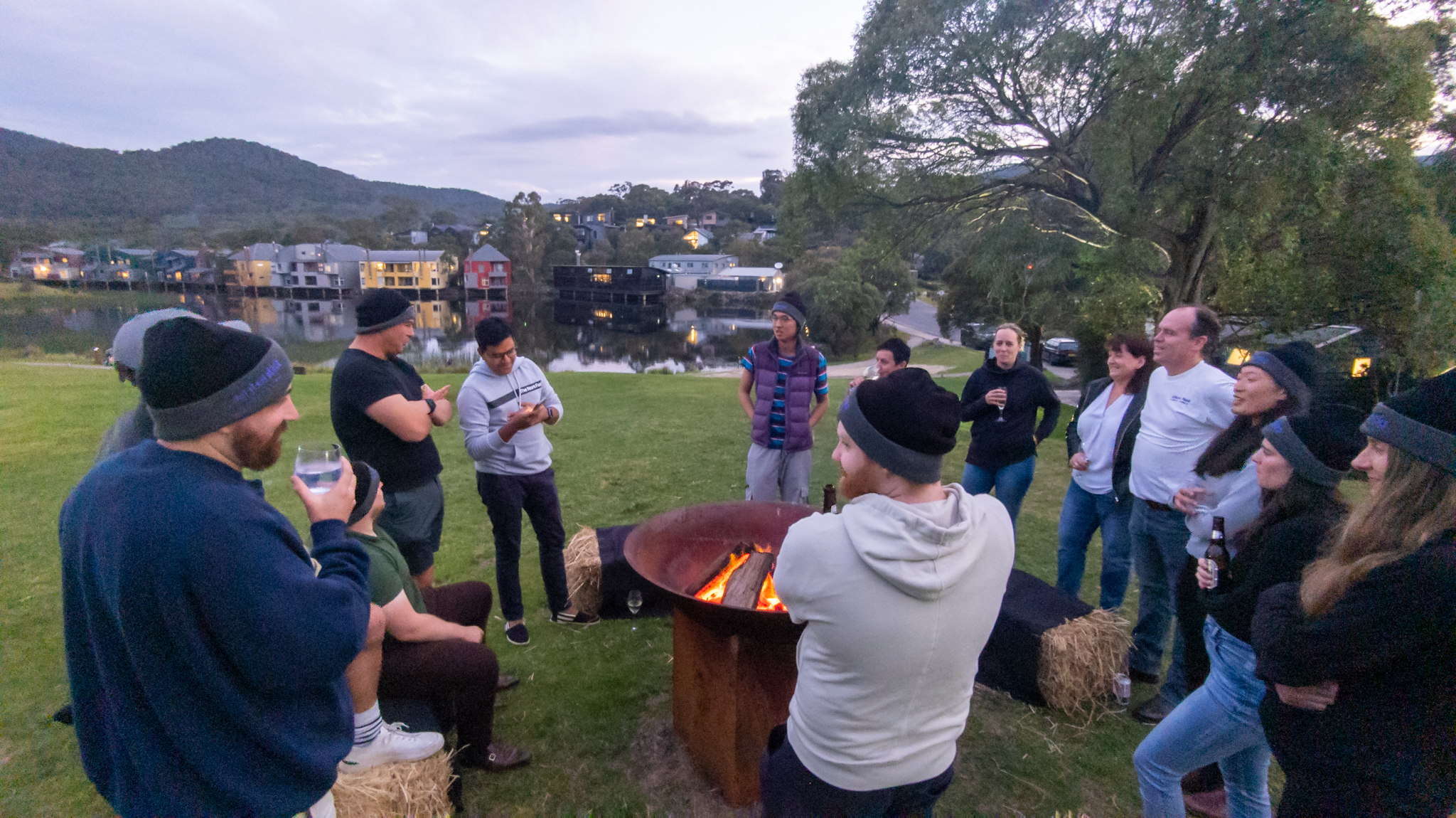
Monday
Monday morning was all about setting the scene. We went over our vision and objectives for the Retreat and reminded ourselves of our ‘rumbling’ techniques to have open, honest, and vulnerable conversations. We took time to focus on ‘rumbling’ to reiterate the intention of the retreat – it wasn’t just to give the team visibility over our strategic planning – but to truly co-design a strategy with input from the whole team. For this, we needed to all be ready to rumble!
Next, we discussed our balanced scorecard and our primary output from the Retreat – our 2022-23 business plan. To develop the business plan, we would hold a separate session for each quadrant of our balanced scorecard (clients, finance, people, internal business), and co-design goals and measures for each using human centred design thinking techniques. We kicked this off on Monday afternoon focusing on clients and finance.
After some frisbee golf to wind down from a big day of strategic planning, we enjoyed a spectacular dinner at Cuisine Restaurant and Bar. As with everything at Lake Crackenback, it was enjoyed with a view! We also use this part of our Retreat to participate in a Sententia tradition that welcomes the new members of team. It was a lovely chance to get to know each other better – who knew how much you could find out about each other just by asking ‘who was your primary school best friend – and what are they up to now?’

Tuesday
On Tuesday morning we explored the people and internal business perspectives for our strategic plan – again using human centred design techniques to co-design our goals and measures.
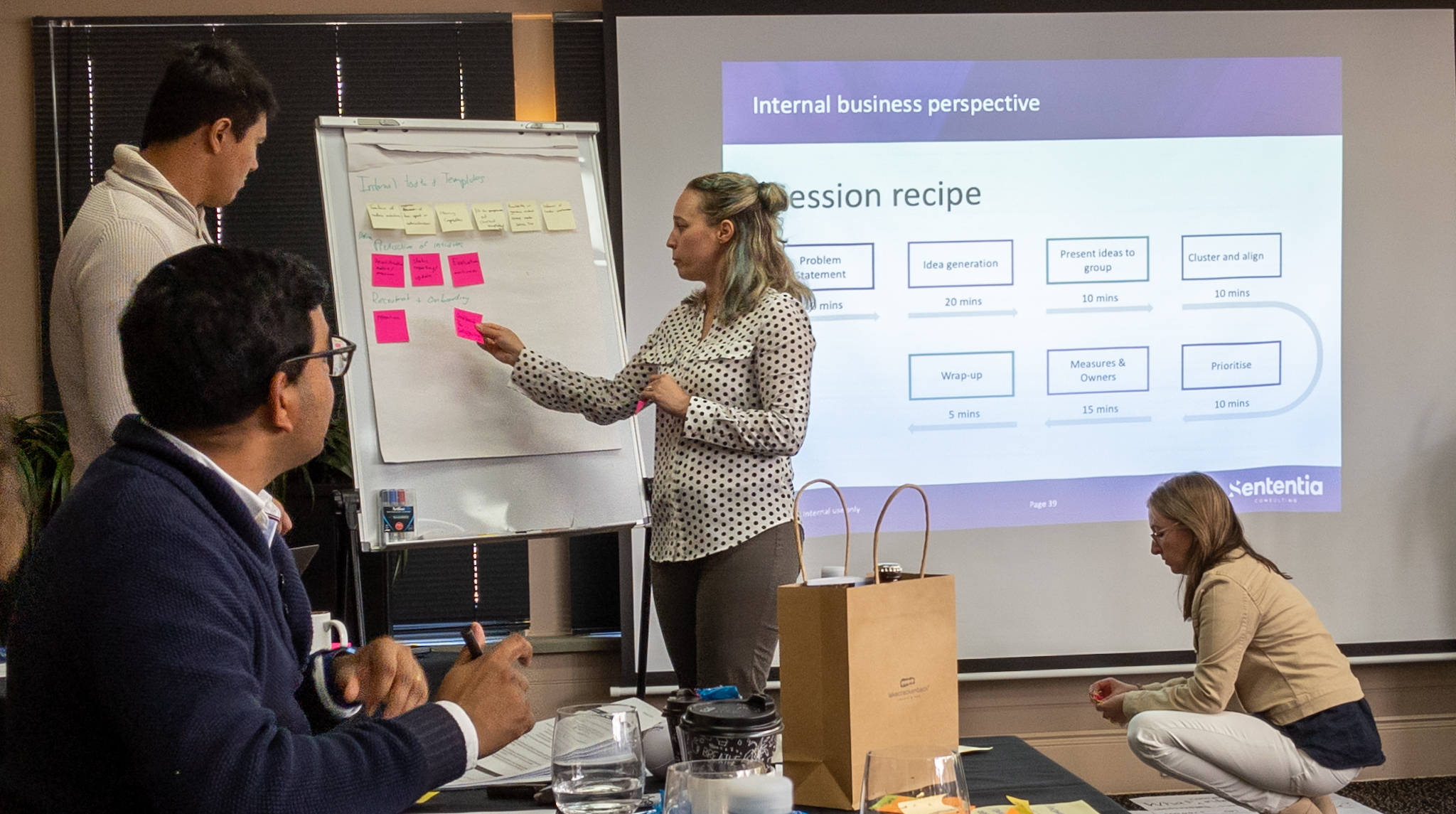
By lunchtime we had what we needed to draft our business plan and could move on to something a bit different for the afternoon.
The Pitch
The Pitch is another Sententia tradition that we started at our first annual retreat. It’s an opportunity for our staff to create a legacy – something they can proudly point to as an initiative that they drove for the business.
All staff were invited to anonymously submit ideas for improving the way we do things prior to the retreat. On Sunday at the Welcome BBQ, the whole team voted for their top three ideas that they wanted to hear more about. On Tuesday afternoon the top three ‘Pitchers’ had their chance to present more detail on their idea. We took advantage of the beautiful surrounds and weather and moved outside to Pitch in the fresh air. After each 5-minute pitch, the team could ask questions and further discuss the idea.
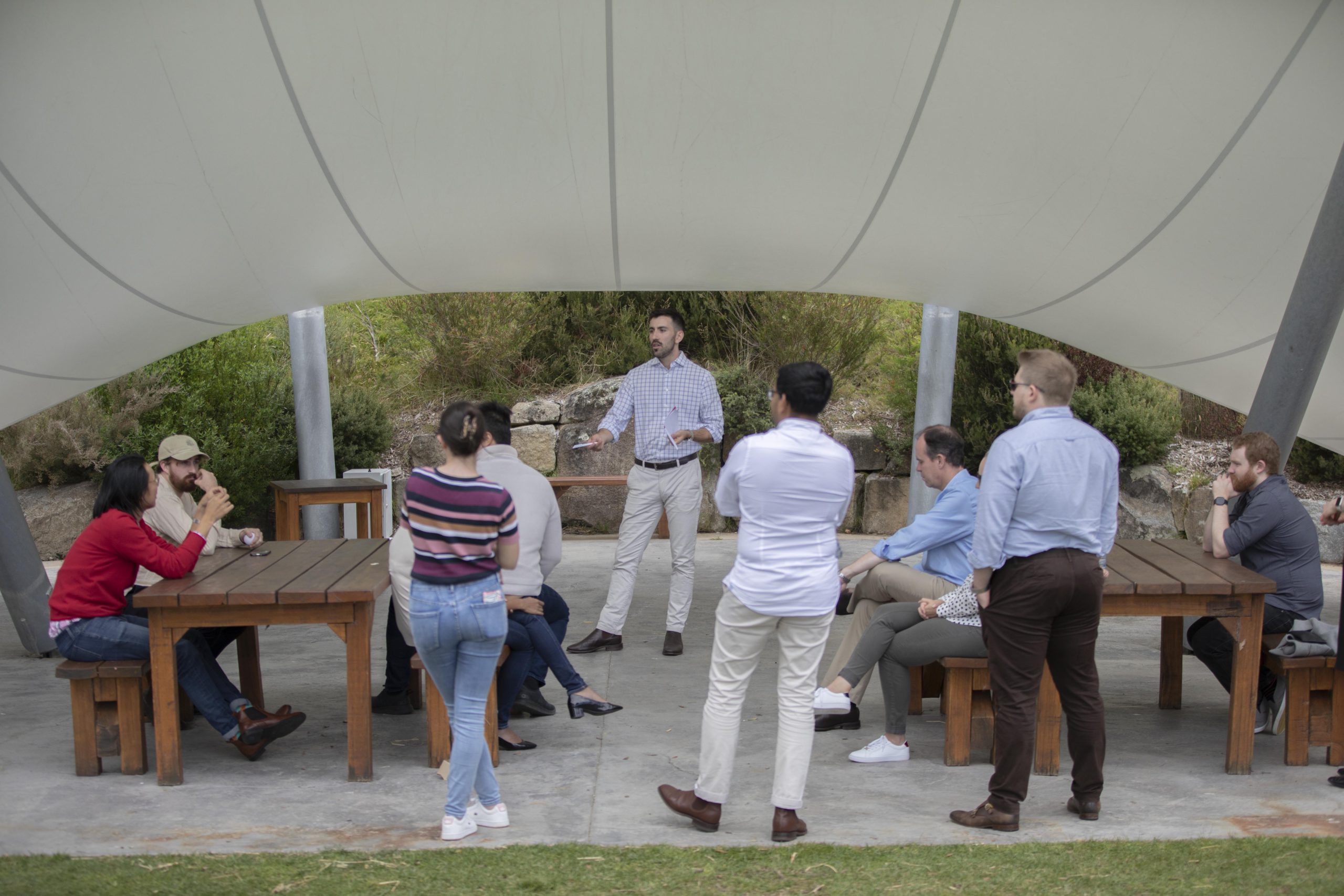
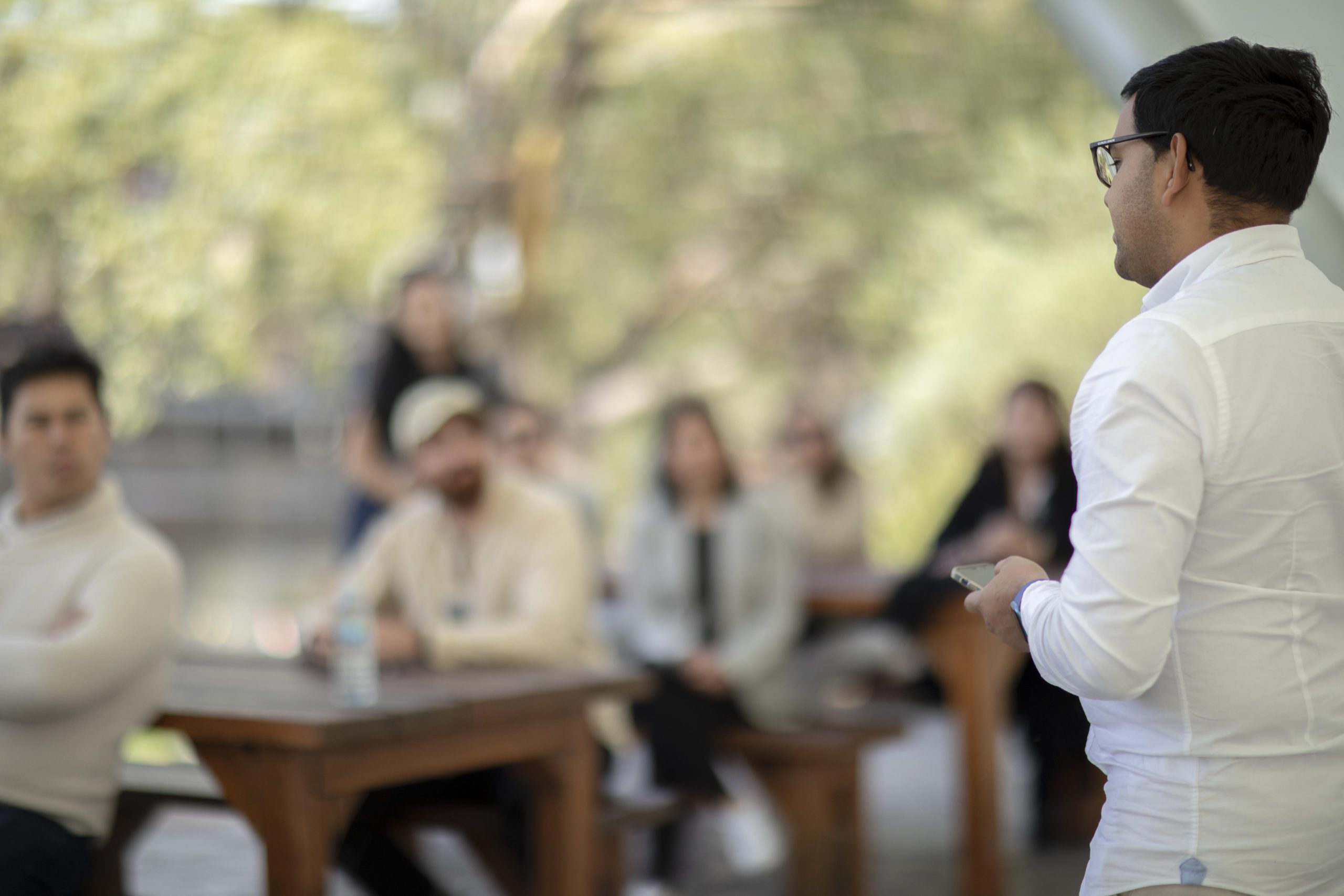
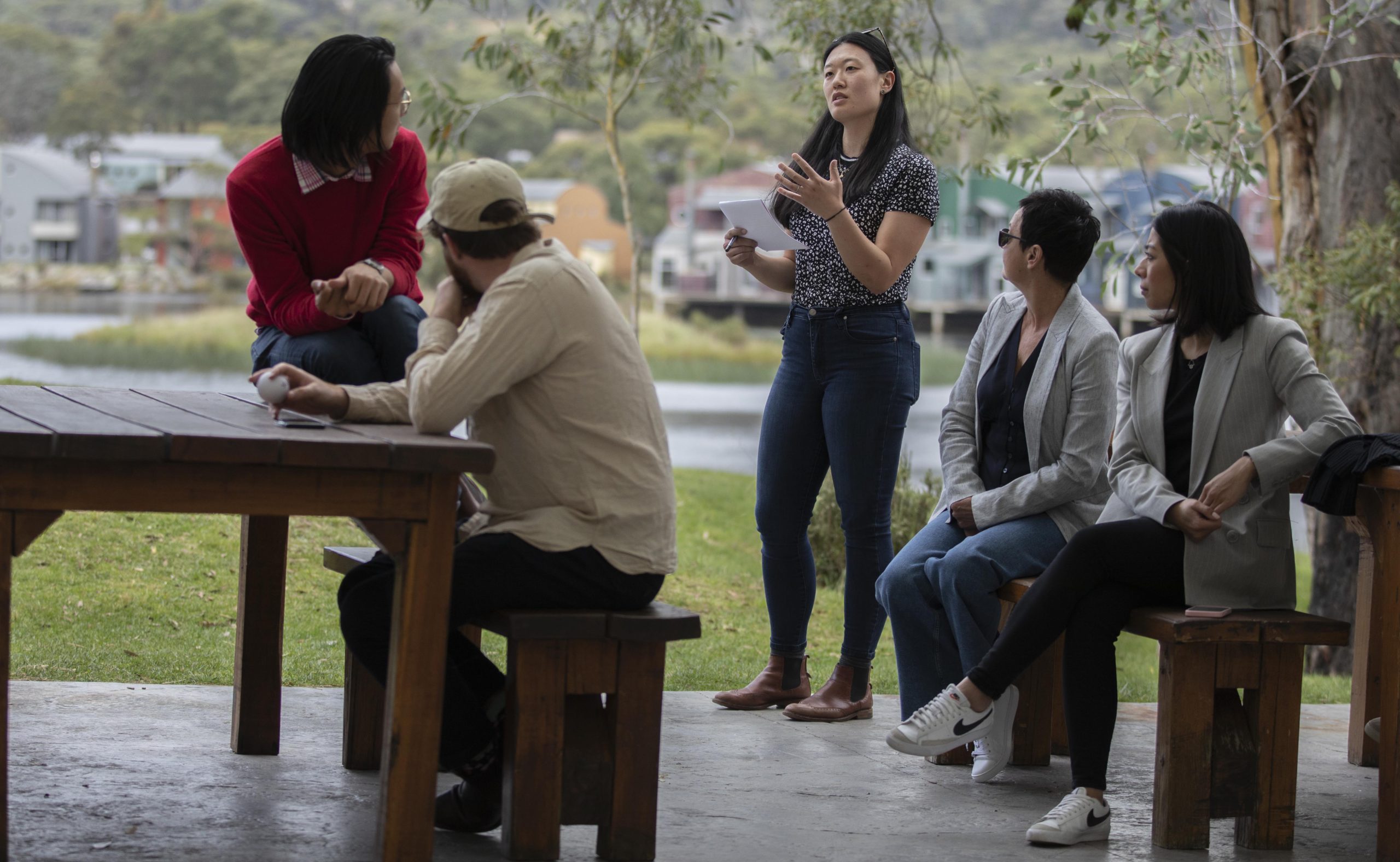
The implementation of last year’s Pitches have made a real and tangible difference to our business and we are excited to see where this year’s Pitches lead us. All three were supported by the team and so over the next year we will be looking to implement “Sen-stainability”, “So you think you are a tough guy? – Resilience Training” and “Sententia Show and Tell”.
Ask Me Anything
To wrap up our final day we held an ‘Ask Me Anything’ session with the leadership team. After two days of defining our vision and planning our strategy for 2022-23 it was a good time to check in to address any lingering questions or things we had always been curious about but hadn’t had the opportunity to ask. We had an open and honest conversation – and it was a two-way street. It gave the broader team deeper insight into what drives decision making and the priorities of the business and helped the leadership team to better understand what is important to our staff. We now all know what keeps the leadership team up at night – and why.
It was a fun, insightful, and highly productive few days that has set us up for success for the next 18 months. We can’t wait to get to work bringing the strategy to life and see what we’ve achieved by next year’s Retreat!
The Sententia Consulting team is growing.
Sententia Consulting is looking for people who are keen to provide experienced advice and genuine support to our clients. Sententia Consulting is a new organisation amongst Canberra’s leading professional consulting firms working across a range of disciplines:
- Strategy and Risk Management
- Audit, Assurance and Review
- Project Confidence
- Probity and Integrity and
- Financial Management and Accounting.
We are looking for people who want to be part of a team that is led by experienced and skilled professionals who work side by side with you, helping you learn, develop and progress.
You will be part of a rapidly growing team of driven and enthusiastic people seeking to put their own stamp on a new and dynamic business.
The Team:
The Sententia team come from a diverse range of backgrounds, including strategy and risk management, audit, assurance and review, project management, probity and integrity, financial management and accounting. Our goal is to make positive contributions to society, to drive change, and to better equip the organisations and people we work with, for it.
As a member of the Sententia team you will be involved in simplifying complex problems, working efficiently and effectively with clients to develop and implement practical solutions. We keep our experienced team at the forefront to implement mature and tested strategy ensuring nothing is overlooked.
The Opportunity:
We deliver high quality consulting and assurance services across a diverse portfolio of clients, from the biggest Federal and State Government departments to smaller statutory agencies and across an exciting range of private clients. We have the type of challenging and interesting work you are seeking.
We have opportunities available for the right people preferably with practical experience within a professional services or government environment, in the areas of governance, risk management, internal audit, assurance or project management. In these roles you will be a fundamental part of our dedicated team delivering high quality services across our client portfolio.
As an experienced consultant you will have the ability to:
- identify and define problems and to articulate potential solution options;
- to work with clients to develop solutions aligned to strategy and business objective;
- identify and implement business improvement opportunities; and
- work independently and as a part of a small cohesive team, to achieve outcomes for a range of diverse clients.
The attributes that we are looking for include:
- strong communication skills (oral and written)
- an ability to work well under pressure
- displays strong interpersonal skills with good stakeholder engagement skills
- strong analytical thinking with an ability to apply your understanding to unique situations to meet project objectives
- a positive attitude and enthusiastic energy.
- a proven ability to work within a collaborative team environment
- confidence to work autonomously with our clients to build trust and deliver value
- a background in management consulting, project management, internal audit, risk management or assurance desirable but not necessary for the right candidate
- minimum 2 to 3 years of professional experience
Salary range: An attractive package of market remuneration and performance bonus
Eligibility
- Must be an Australian citizen.
- Must be able to obtain a minimum of Baseline Security Clearance if required.
- Police check will be required
If this sounds like your next role please send your resume and a statement of interest to kim.harrison@sentcon.com.au with the reference SEEK: Experienced Consultant application
Sententia Consulting is growing quickly and looking for people who want to be part of influencing change at our clients.
Are you keen to apply your knowledge and experience to help our clients simplify their complex problems and find resolutions? Do you want to contribute to positive contributions to society? Would you like to be part of a team that is led by experienced and skilled professionals who work side by side with you, helping you learn, develop and progress?
The Sententia team come from a diverse range of backgrounds, including strategy and risk management, audit, assurance and review, project management, probity and integrity, financial management and accounting. Our goal is to make positive contributions to society, to drive change, and to better equip organisations and people for it.
As a member of the Sententia team you will be involved in making simplifying complex problems, working efficiently and effectively with clients to develop and implement practical solutions. We keep our experienced team at the forefront to implement mature and tested strategy ensuring nothing is overlooked.
You will have the ability to:
- identify and define problems and to articulate solution options;
- create supporting policies, artefacts and tools to support agreed solutions;
- work with clients to develop solutions aligned to strategy and business objective;
- identify and implement business improvement opportunities; and
- work independently and as a part of a small cohesive team, to achieve outcomes for a range of diverse clients.
The attributes that we are looking for include:
- big thinkers for big problems;
- creativity, flexibility and a desire to learn and share;
- excellent stakeholder engagement skills; and
- an understanding of project objectives and an ability to apply your understanding to unique situations
Sententia Consulting offers you:
- the opportunity to work across a diverse and exciting range of clients and projects that are complex, high profile and relevant;
- our senior people are pivotal on every project giving you the opportunity to observe and learn from experienced professionals daily;
- you will have a unique opportunity to be involved in growing and driving development in a new and exciting firm where your opinion is valued and listened to.
Due to the nature of many of our clients you may be required to obtain a security clearance.
If you would like to explore the opportunities that await you working for Sententia Consulting please get in touch, we are always looking for the right people across a range of skills and experiences.